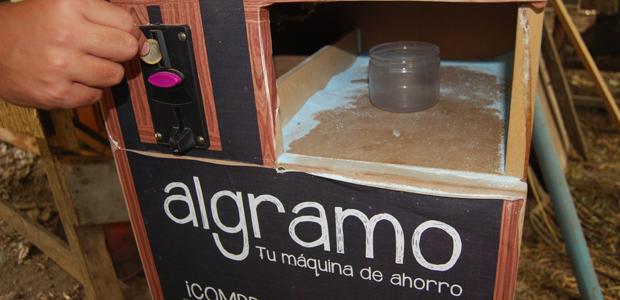Affordable Washing Detergent for the Poor in Chile
Algramo vending machine (Photo: Joaquin Trujillo Campos)
For people in a poor neighborhood of Santiago, Chile, money can be so tight that it's a hardship to buy something as basic as a box of laundry detergent. They often wind up buying laundry soap in small packets, which ultimately costs them more.
"Sometimes, we just can't afford the prices," says Baez. In the past, she says, you could buy a half stick of butter if you didn't have enough money, and just pay half-price.
"Why can't we go back to the old times?"
José Moller took that question seriously. The Chilean student protester turned social entrepreneur decided to build a simple vending machine made out of wood that sells small amounts of powdered detergent at a 40 percent discount.
Moller says he's able to keep costs down because he buys in bulk and there's no marketing. There's no packaging, either.
To demonstrate, Moller drops three coins (each worth about 25 cents) into the "Algramo" machine. It pours 200 grams of detergent into a reusable cup — enough for four loads of laundry.
Moller says this kind of machine wouldn't mean much for a family living on a middle-class income. "But for the poorest families in the country, the ones we're trying to help, it can have a significant impact."
The vending machine is set up outside a local mini-market called Berosh in Huechuraba. The owner, Patricia Sagredo, who lives in the back, gets a cut of the sales. She says the machine has doubled her profit margin on detergent.
Sagredo says she's pleased that the machine helps out the neighbourhood. She remembers what it was like to scramble to buy basics.
"Now, thank God, I have my store here, but I feel for the families that really are in need."
Moller is considering bringing more discounted products like rice, lentils and sugar to Huerchuraba. But not every product lends itself to vending machine sales, according to Moller. There has to be a steep gap between the shelf and factory price; otherwise, you can't sell for much less than the name brand.
"And we're looking at making a machine that sells oil and liquid soap."
Moller is building on the original idea with the help of a $60,000 grant from a social entrepreneurship competition called Desafio Clave. He hopes to have 100 machines in Huechuraba's mini-markets by November; ultimately he'd like to expand into other countries.
During the two-week trial period in November, the three machines in Huechuraba got a lot of action. Veronica Baez says it sold out of detergent in a week, so she's pleased to see the machines coming back.
"It lets you save a few pesos for the bus or to buy a few things," she adds.
Saving about 15 cents a load won't pull Baez out of poverty, but it could help a neighborhood where every peso counts.
Our coverage reaches millions each week, but only a small fraction of listeners contribute to sustain our program. We still need 224 more people to donate $100 or $10/monthly to unlock our $67,000 match. Will you help us get there today?
